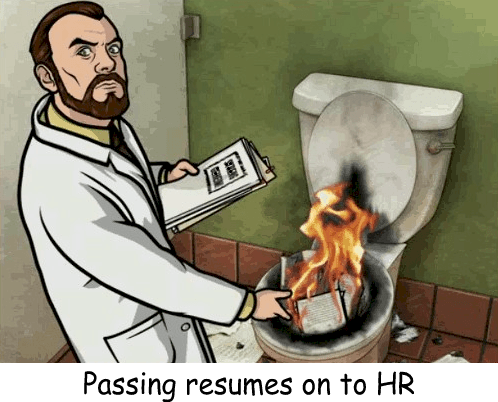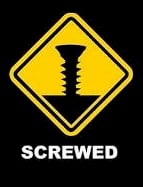In the November 4, 2014 Ask The Headhunter Newsletter, a job seeker’s mail to a hiring manager winds up routed to HR:
Question
What if the hiring manager forces you to deal with the personnel department?
My friend’s mom works at the company where I want to work. She came through with the name of the hiring manager for the job I want. I’ve learned from your articles that it’s best to go straight to the manager. So, I wrote a good letter demonstrating how the strong points of my background would make me the right person for the position and sent it to the manager. Now I find out the manager just passed it on to the recruiter for review!
So, what do you do when the hiring manager forces you through the recruiter?
Nick’s Reply
 Every time I hear that someone had a friend “get me a manager’s name” I want to laugh uncontrollably.
Every time I hear that someone had a friend “get me a manager’s name” I want to laugh uncontrollably.
You went to a lot of trouble to develop a good inside contact, but then you squandered it. No offense, but I’ve got to say this: You’re acting like just another job candidate, and the manager is treating you that way.
When you get a personal referral to a hiring manager, you don’t write a letter. You use that referral to establish a more personal level of contact.
(For an example, see How to get the hiring manager’s attention.)
You would have gotten the most mileage out of this by having your friend’s mother actually go talk to the manager. She should just poke her head in the manager’s door and make a clear referral:
How to Say It
“I heard you’re looking for someone to do XYZ, and I thought I might be able to help you out. There’s someone you should talk to who would be great at this job. His name is… Would you be interested in talking with him?”
This is a preemptive reference. If your friend’s mom isn’t willing to go the extra mile to help you, then you’re wasting your time and hers, too. To boost the mom’s willingness to help, first get your friend to introduce you to her mom. Make it personal.
Here’s the key to this approach: There is no resume. Offering the manager a resume — or even a letter — is the best way to make him ignore you. (And that’s exactly what happened.) If you ever want to recommend someone to a manager, tease the manager. You read that correctly. Tease. It’s what every advertisement does to make you want to try or buy a product. Make the manager crave an introduction.
If the manager is interested, what your friend’s mom says next is crucial.
How to Say It
“He’s being pursued by a couple of companies and you’d have to move quickly if you want to interview him. If you’d like, I’d be glad to invite him over for lunch in the cafeteria and you could drop by to meet him.”
This builds the tease to a higher level. It forces the manager to make a choice immediately. Does he want to meet an in-demand job seeker, or not? Does he want to beat his competitors to the punch, or not? This is how to Get past the guard.
One way or the other, you’ll know immediately. Inserting a letter or resume into this process merely drags it out. But you want a clear indication now about whether the manager is really interested. So, force the manager to take an action now. Having lunch is an action. Passing your resume on to HR is a cop-out for you, your friend’s mom, and the manager.
If your friend’s mom’s pitch works, and you get to talk to the manager, here’s how to get an in-person meeting.
How to Say It
“My name is John Jones. Ellen Smith suggested I give you a call, after she explained that you’re facing some challenges with doing X,Y,Z. I’ve put together a brief business plan. If you have a few minutes to meet, I’d like to show you how I could tackle those challenges and related problems you’re facing, to help make your business more successful.”
Reprinted from “Pest or manager’s dream?” (pp. 18-19) in the PDF book, Fearless Job Hunting, Book 3, Get in The Door (way ahead of your competition).
If the manager doesn’t invite you in after that, then anything else you do will be a waste of time because the manager simply doesn’t get it. In another section of the same book (“Drop the ads and pick up the phone,” pp. 9-11), a successful job seeker tells how she got an interview without providing a resume at all.
It’s very common for a manager to route all resumes to HR. Here you had a great inside contact, but you still relied on an impersonal approach that made it easy for the manager to ignore you. If your contact had gone a step further, you’d be talking directly to the manager (whether in the cafeteria or on the phone) while your competition wallowed in that stack of resumes on HR’s desk.
What should you do now? Ask your friend’s mother — do this yourself, not through your friend — to go tell the manager he’s going to miss out on a great candidate. “I suggest you call him directly yourself as soon as possible. He’s in demand and won’t be around by the time HR calls him. I’m not sure he’d even talk with HR at this point in his job search — I believe he’s got offers.”
Yes, this is assertive. It requires a strong referral, or the referral is worthless. (Most referrals, like the one you’re using, are weak.) In the meantime, move on to something else while you wait. But please: Do this differently next time. Don’t send letters or resumes. Call. Job seekers who rely on documents usually see those documents routed around while the assertive applicants are having interviews.
Of course, it could be that this particular manager just won’t talk to candidates until they go through HR. I’d think twice about working for such a manager. (See The manager’s #1 job.)
How do you get in the door? Have you learned the art of teasing managers, or do you let managers tease you by “passing your resume along to HR?”
: :


